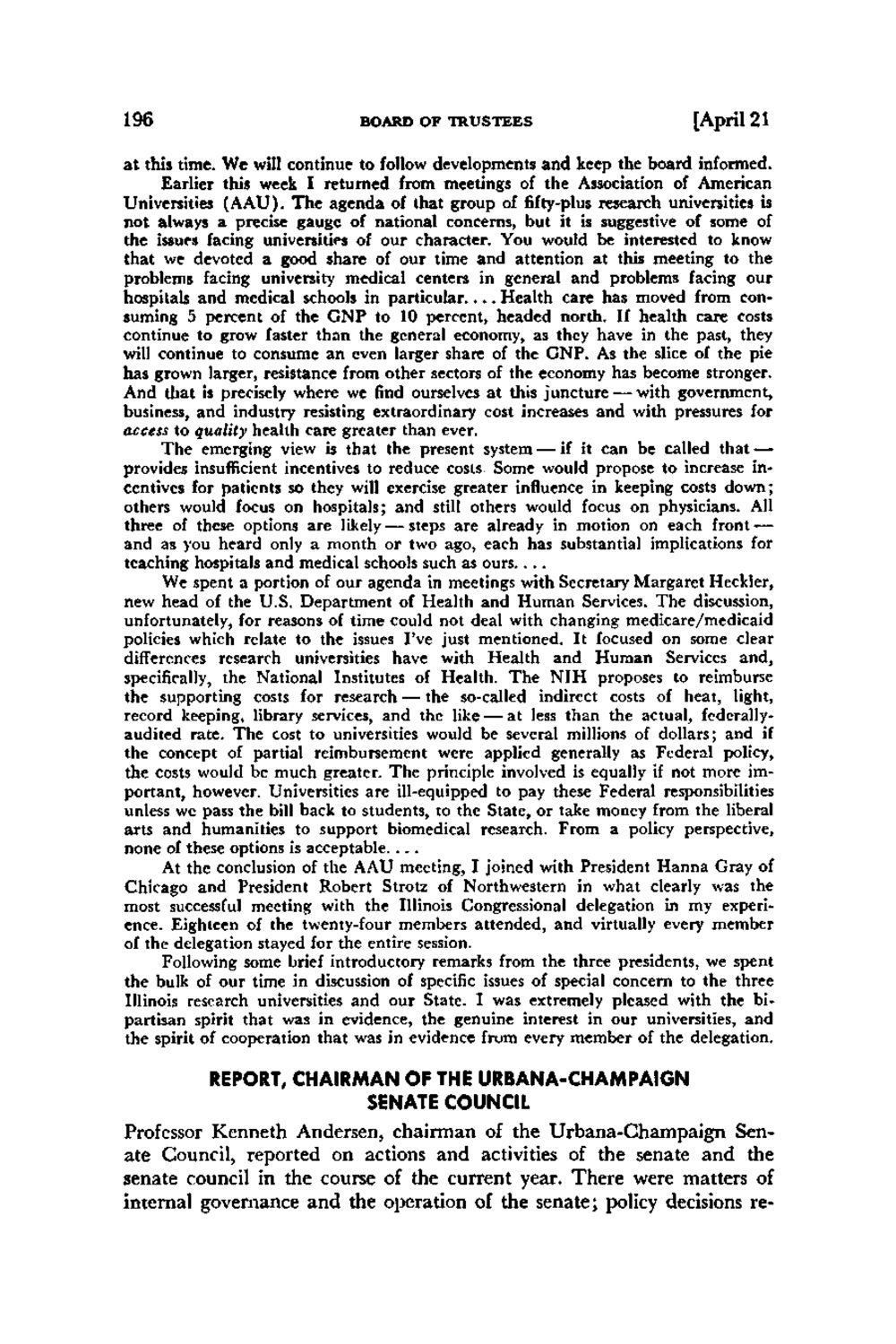| |
| |
Caption: Board of Trustees Minutes - 1984
This is a reduced-resolution page image for fast online browsing.

EXTRACTED TEXT FROM PAGE:
196 BOARD OF TRUSTEES [April 21 a t this time. We will continue to follow developments and keep the board informed. Earlier this week I returned from meetings of the Association of American Universities ( A A U ) . T h e agenda of that group of fifty-plus research universities is not always a precise gauge of national concerns, but it is suggestive of some of the issues facing universities of our character. You would be interested to know that we devoted a good share of our time and attention at this meeting to the problems facing university medical centers in general and problems facing our hospitals and medical schools in p a r t i c u l a r . . . . Health care has moved from consuming 5 percent of the G N P to 10 percent, headed north. If health care costs continue to grow faster than the general economy, as they have in the past, they will continue to consume an even larger share of the GNP. As the slice of the pie has grown larger, resistance from other sectors of the economy has become stronger. And that is precisely where we find ourselves at this juncture — with government, business, and industry resisting extraordinary cost increases and with pressures for access to quality health care greater than ever. The emerging view is that the present system — if it can be called that — provides insufficient incentives to reduce costs Some would propose to increase incentives for patients so they will exercise greater influence in keeping costs down; others would focus on hospitals; and still others would focus on physicians. All three of these options are likely — steps are already in motion on each front — and as you heard only a month or two ago, each has substantial implications for teaching hospitals and medical schools such as ours. . . . We spent a portion of our agenda in meetings with Secretary Margaret Heckler, new head of the U.S. Department of Health and Human Services. The discussion, unfortunately, for reasons of time could not deal with changing medicare/medicaid policies which relate to the issues I've just mentioned. It focused on some clear differences research universities have with Health and Human Services and, specifically, the National Institutes of Health. The N I H proposes to reimburse the supporting costs for research — the so-called indirect costs of heat, light, record keeping, library services, and the like — at less than the actual, federallyaudited rate. The cost to universities would be several millions of dollars; and if the concept of partial reimbursement were applied generally as Federal policy, the costs would be much greater. The principle involved is equally if not more important, however. Universities are ill-equipped to pay these Federal responsibilities unless wc pass the bill back to students, to the State, or take money from the liberal arts and humanities to support biomedical research. From a policy perspective, none of these options is acceptable. . . . At the conclusion of the AAU meeting, I joined with President Hanna Gray of Chicago and President Robert Strotz of Northwestern in what clearly was the most successful meeting with the Illinois Congressional delegation in my experience. Eighteen of the twenty-four members attended, and virtually every member of the delegation stayed for the entire session. Following some brief introductory remarks from the three presidents, we spent the bulk of our time in discussion of specific issues of special concern to the three Illinois research universities and our State. I was extremely pleased with the bipartisan spirit that was in evidence, the genuine interest in our universities, and the spirit of cooperation that was in evidence from every member of the delegation. REPORT, CHAIRMAN OF THE URBANA-CHAMPAIGN SENATE COUNCIL Professor Kenneth Andersen, chairman of the Urbana-Champaign Senate Council, reported on actions and activities of the senate and the senate council in the course of the current year. There were matters of internal governance and the operation of the senate; policy decisions re-
| |